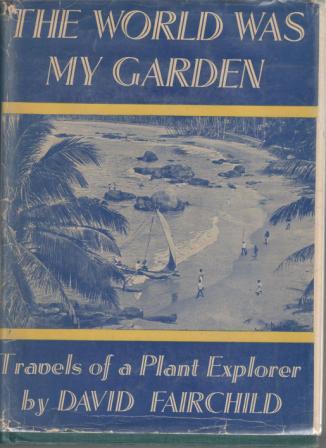It’s a rainy day in the upper Midwest. My favorite time to read. Of course, I should be writing papers, grading papers, or setting up seminars for next semester. But instead I’m drawn to my bookshelves. In most professors offices that I visit the shelves are an odd mix of old and new books that focus on the particular subject which that professor works on, along with the scientific journals that relate to that discipline. It’s no different in my office, except that I tend towards older books and my tastes are just a little bit more eclectic than most. I have a particular fondness for old entomology texts and I also like books on garden remedies — whether old or new, academic or not.
In a future post, maybe next week or so, I’m going to go down a rogues gallery of books that I don’t care for, old or new. But today I’m going to do something a little different, I’m going to tell you the three books that I think are must reads for any gardener or horticulturist. But the catch is that none of these books are currently in print and so you’ll need to search for them or go to Amazon.com where you can often find dealers who have used copies. These books aren’t listed in any particular order, except the order in which they came to my mind when I put this post together.
Best Reading Book — The World was my Garden, written by David Fairchild, is one of the best horticultural reads of all time. I’ve heard Fairchild called the last of the great plant explorers as well as the father of modern plant exploration. Either title works. I wouldn’t call him the greatest plant explorer of all time (though it’s no stretch to say that he was one of the best), but he is certainly the most skilled writer (at least in my mind).

Best Informational Book(s) — The Standard Cyclopedia of Horticulture edited by L. H. Bailey is a series of three (or more depending on the edition you get) books which is basically a humongous encyclopedia of everything horticultural. The beauty of these books is the amount of information they deliver along with the appreciation that the writers (and especially the editor who many consider the father of modern horticulture) had for the art and science of horticulture. So often we, as professors, want to explain things “scientifically.” Sometimes gardeners just want to talk about horticulture as an “art”. This cyclopedia does a great job of appreciating horticulture from both sides. My favorite section is one called “horticulturists” where an overview of some of the greatest horticulturists of all time is offered, one of the saddest being E. G. Lodeman who died young, but not before writing another of my favorite books of all time, “The Spraying of Plants” — which I won’t include here because it’s a book that will only appeal to a very small audience (those who want to know about pesticides used before1900).
Best Book on Insect Control — Destructive and Useful Insects is a classic text on insect control which has seen many editions dating back to the 1920s. The best edition, at least in my mind, is the 2nd edition. The second edition of this book was out before the widespread use of DDT and so, while lead arsenate is recommended a little more than I’d like, there are lots of cultural remedies for controlling insect pests listed also.
I’d love to hear about some of your favorite out-of-print books also — anything from general horticulture to plant pathology and entomology — Let me know what your must-haves are!
One of my favourite gardening books of all time is Russell Page's The Education of a Gardener. I'm afraid it doesn't qualify as being out of print, but it was first published in 1962. He was such an eloquent writer – a delight to read. His philosophy on gardening is very close to my own. The quote from the book is [forgive the length], "Throughout the years this [life] has added up to a wide and special experience. I write ‘wide’ deliberately. I know nothing whatever of many aspects of gardening and very little of a great many more. But I never saw a garden from which I did not learn something and seldom met a gardener who did not, in some way or another, help me."
It's a very Socratic approach to gardening – the more you know, the more you are aware of what you don't know!
Another book that's just been released that you might be interested in, Jeff, is called "Bugs and the Victorians" by J.F.M. Clark. It's a trip through the Victorian naturalist's obsession with all things entomological, with lots of interesting and eccentric historical characters along the way – many of whom are unknown in entomology today, but by no means deserve to be! A lot of them were pioneers who have fallen into obscurity.
You can bet I'll be looking up "Bugs and the Victorians". Thanks Jimbo!
I don't know whether these books fall into the gardening or the environmental category or they're a little of both but three of my favorite older books are:
Reading the Landscape of America – May Watts
Stalking the Wild Asparagus – Euell Gibbons
Are Pesticides Really Necessary? – Keith Barrons
The last one is not as well known and is from the early 80's and follows along the lines of Silent Spring. After reading it, it is hard to believe it was written almost 30 years ago since so much of it what he's talking about is in the now on all these forums.
Were we really that dense that many years ago?